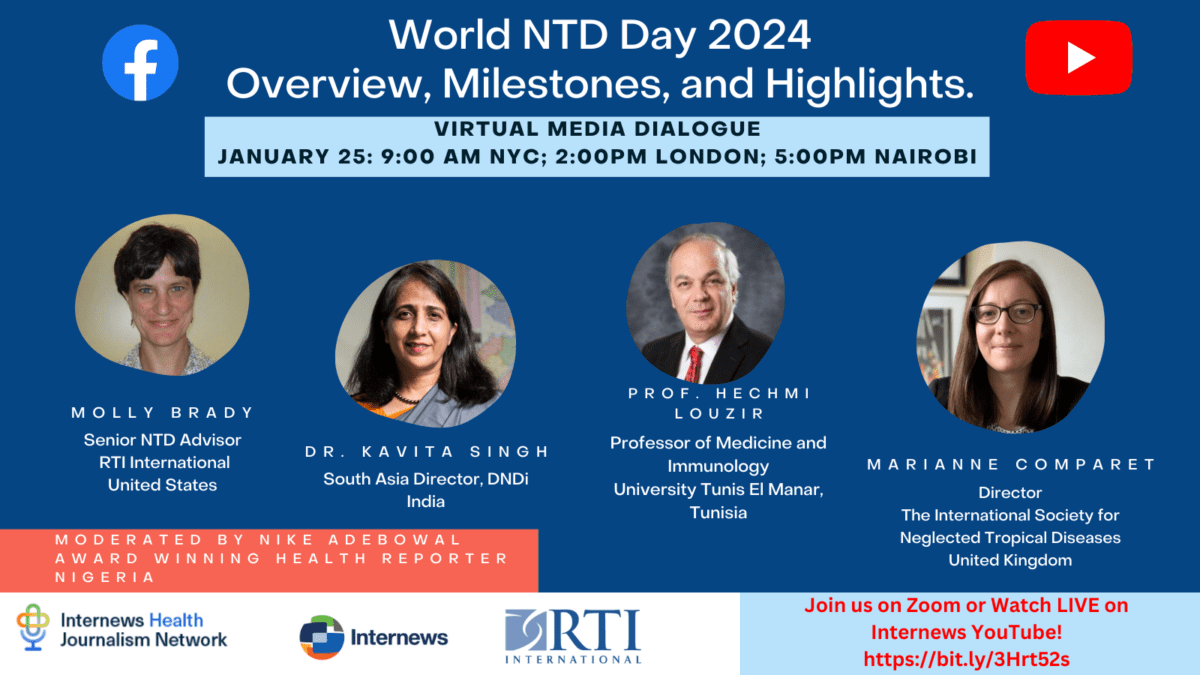
By Sydney Blakeney, Internews
This year’s theme for World Neglected Tropical Diseases Day, which is commemorated on January 30th, is Unite. Act. Eliminate! In the lead up to this health day, the HJN hosted a virtual media dialogue on Thursday, January 25th with four global health experts and moderator Nike Adebowale from the Nigeria Premium Times to discuss what steps we should take to combat these diseases in the coming years.
Neglected Tropical Diseases (NTDs) are a group of 26 illnesses that primarily impact people living in tropical areas and in conditions of marginalization and poverty. Since the launch of both the first WHO road map and the London declaration on neglected tropical diseases in 2012, World NTD Day seeks to raise public awareness for this diverse group of ailments that are often not prioritized in the global health agenda. The virtual event was an opportunity to reflect on where we are on the road to eliminating these diseases and what needs to be done going forward.
The Current State of NTDs Globally
NTDs are caused by various pathogens including viruses, bacteria, parasites, fungi and toxins, and are responsible for devastating health, social and economic consequences. It is estimated that NTDs affect more than 1 billion people, while the number of people requiring NTD interventions (both preventive and curative) is 1.6 billion.
Important milestones have been achieved in making progress towards eliminating tropical diseases. Molly Brady, Senior NTD Advisor for RTI International, stated that, “Fifty countries have eliminated at least one NTD, which is halfway to the World Health Organization’s target that they set in the 2030 roadmap.”
In 2023 alone, six countries announced elimination of at least one NTD. Additionally, teams of health workers, social mobilizers, and researchers are working tirelessly to increase awareness and access to treatment in communities around the world.
However, there challenges persist when attempting to treat harder-to-reach populations (individuals working long hours away from home, migrating with livestock or living in insecurity and conflict areas) and those living in urban areas. Brady emphasized the need to work with new partners to connect with those communities such as veterinarians, humanitarian agencies, and journalists to inform communities, respond to specific needs or clarify misinformation. While important milestones have been achieved, much more needs to be done, especially when considering today’s global challenges.
Challenges in Drug and Vaccine Development
Dr. Kavita Singh, Director for South Asia at Drugs for Neglected Diseases Initiative (DNDi) in India highlighted the historical imbalance of drug development for neglected diseases. For decades, the prevailing profit-oriented model for medical research and development leaves little incentive to develop drugs for the poorest and most vulnerable communities, such as those suffering from NTDs. Marianne Comparet, Director for The International Society for Neglected Tropic Diseases underscored this imbalance by sharing that 1 in 5 people are suffering from NTDs globally; however, in the last decade only 4% of 850 new therapeutic products registered have indications for neglected diseases. Thus, in practice, only 10% of spending on health research goes toward improving and tackling 90% of the global disease burden seen across the globe.
Organizations like DNDi and global health experts such as Dr. Hechhmi Louzir, former Director General of the Pasteur Institute of Tunis and Professor of Medicine and Immunology at El Manar University in Tunis, highlighted the necessity for NGOs and public health collaboration to create viable treatment for NTDs. DNDi’s successful programming in Southeast Asia over the past 20 years led to multiple countries eliminating lymphatic filariasis-a parasitic disease that affects the lymph nodes and lymph vessels-as a public health problem all together, while inspiring neighboring countries to invest in R&D for treatment. Case studies brought forth by experts, such as Leishmaniases, a parasitic disease spread through sand flies, also reveal the need to develop new vaccinations as a more sustainable and preventive approach to tackling this issue.
Health communicators are absolutely essential, whether it’s in improving the understanding of the disease, sharing the latest research, but also really making sure that NTDs remain relevant in a much wider context of global events.
Marianne Comparet, Director, The International Society for Neglected Tropical Diseases, UK
The Role of Health Journalists
Health journalists, whether reporting on NTD prevalence in their communities, or aiding in the fight to advocate for the inclusion of a disease on the WHO list, such as Noma, must continue to work towards the elimination of these diseases through their reporting. Stories on the importance of vaccine development, available treatment and rehabilitation services, challenges in financing, accessing resources, or even the implications for looking at these diseases through a One Health lens, can raise awareness for the myriad of NTDs affecting the global population – and particularly those that are most vulnerable. While accessing data can be difficult in some countries, journalists must do due diligence to ensure accurate and up-to-date information reaches affected communities. Fostering relationships with global health experts can offer a deeper understanding of these diseases, their root causes, and what is being done to eliminate them.
Now more than ever, health journalists must be engaged to push the needle forward in eliminating neglected tropical diseases by 2030.
Read Adebowale’s report on Noma in Nigeria
Additionally, HJN member organization, Nigeria Health Watch, lead an advocacy and communications project for Noma Aid Nigeria Initiative (NANI) that helped raise awareness about the disease and the new Noma treatment centre built within the premises of the National Hospital in Abuja. Check out some editorials below that came out of this project:
Why we must accelerate the inclusion of Noma as a Neglected Tropical Disease
Extreme poverty, ignorance, malnutrition, poor routine immunization and others fuel Noma